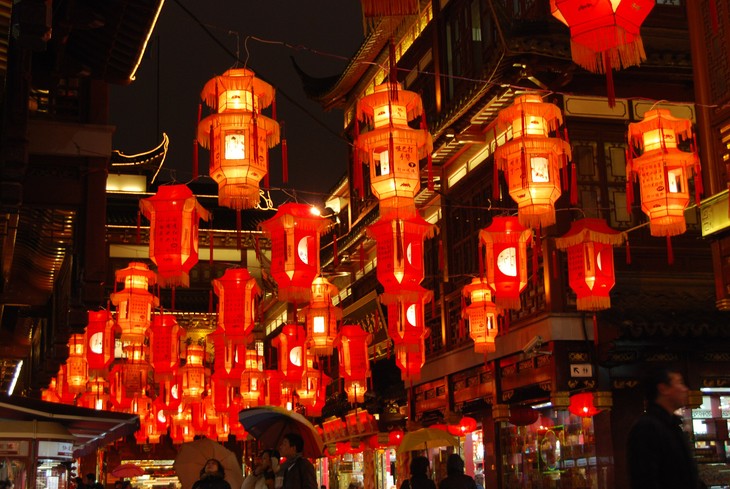 Beautiful lanterns light up streets in China at the end of the Spring Festival. (Photo: Creative Commons) Beautiful lanterns light up streets in China at the end of the Spring Festival. (Photo: Creative Commons) |
"It’s the event I look forward to the most every year. The Lantern Festival, or Yuanxiao Jie, is a traditional festival in China. It is always held on the fifteenth day of the first lunar month, so this year it will fall on February 24, which marks the end of the Spring Festival," said Xuemei Chen, a student at Northwest University in Xi’An.
Centuries ago, the Lantern Festival could be viewed as the Chinese version of Valentine’s Day, as it was one of the rare occasions when single people could mingle. But it’s no longer thought of as a day for finding love.
Nowadays, families and friends get together to enjoy the dazzling light of thousands of lanterns and savor some traditional delicacies. How exactly this centuries-old custom began is still being debated. Some believe the festival was influenced by Zoroastrianism, an ancient Iranian religion. Others say it began with Qin Shi Huang, the first emperor of China, who ordered a lavish celebration to ask the God of Heaven for favorable weather and his own health in the new year. But the most common theory is that it began in the Han Dynasty, according to Xuemei.
"It has been around for almost 2,000 years, since the Han Dynasty, but the exact origin is still unknown. To be honest, I’ve heard different stories, but a lot of people say it came from a Buddhist tradition, since Buddhist monks light lanterns on this day. Emperor Ming, a follower of Buddhism, ordered people to do the same and light lanterns in their home. Perhaps that’s how Yuanxiao Jie began," he said.
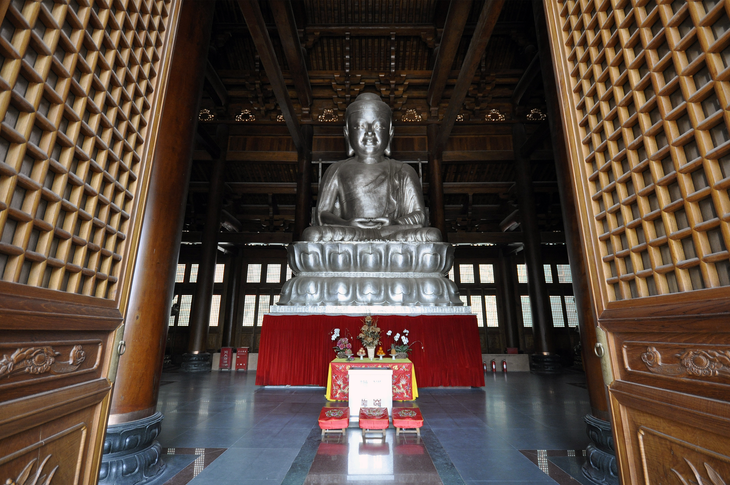 China's Lantern Festival is said to have originated from Buddhism. (Photo: Creative Commons) China's Lantern Festival is said to have originated from Buddhism. (Photo: Creative Commons) |
If you visit China during the Lunar New Year celebration, you’ll find the traditional red, oval-shaped lanterns with small gold tassels everywhere. The Chinese believe the color red brings good fortune. As the lantern festival has grown in scale, the shapes and sizes of the lanterns have evolved. In the ancient city of Xi’An, an 18-meter dragon-shaped lantern has been on display since February 2 for the city’s 52-day lantern festival.
"Of course, people come here for the lanterns. It’s a magical scene. I got kind of dizzy from all the lights. I remember coming to the Tang paradise park last year and saw some huge lanterns that were maybe 10 meters high – as tall as a building!”
“The traditional lanterns are made from bamboo and paper, but now there are more durable materials. And the lanterns come in many shapes, too! There are tigers, fish, characters from Chinese fairy tales and, since it’s the year of the dragon, I think there will be lots of dragon lanterns this year as well. There are a lot of people, so all the light shows and the noise from people, plus the music, make a really festive atmosphere," Xuemei said.
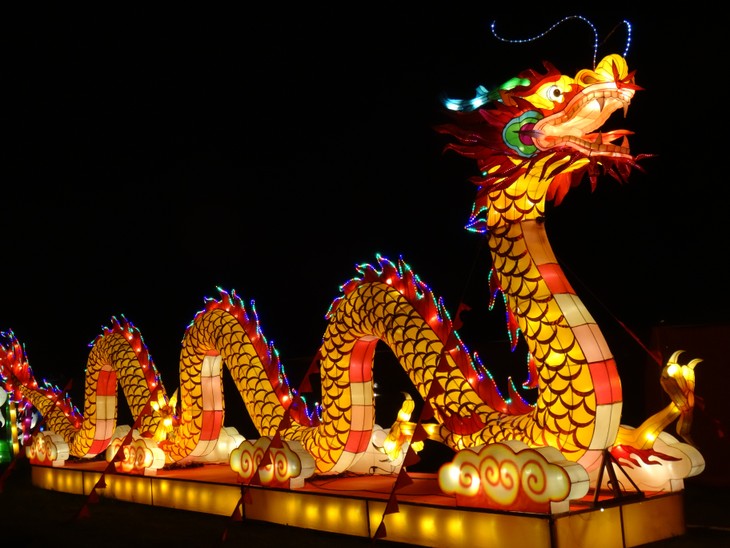 A meticulously designed lantern in the shape of the dragon erected in China (Photo: Public Domain) A meticulously designed lantern in the shape of the dragon erected in China (Photo: Public Domain) |
One of the activities of the Lantern Festival is solving riddles. Short yet challenging riddles are written on the lantern, or on a piece of paper attached to the lantern. Each riddle has three parts: the question, a hint, and the answer. Xuemei said these riddles are traditionally hung in front of people’s homes.
"People often hang lanterns outside their home with riddles written on them. This tradition is from the Song Dynasty. It is not really my kind of activity, but many people love doing it. They are usually some form of wordplay, so I think it will be quite difficult if you are not fluent in Chinese. If you can guess it correctly, you receive a reward from the host but, personally, I rarely can get the correct answer. And there are also dragon and lion dances performed to the accompaniment of gongs and drums. As a kid, I used to be afraid of these dances, but now I think they’re the soul of the New Year celebration," he added.
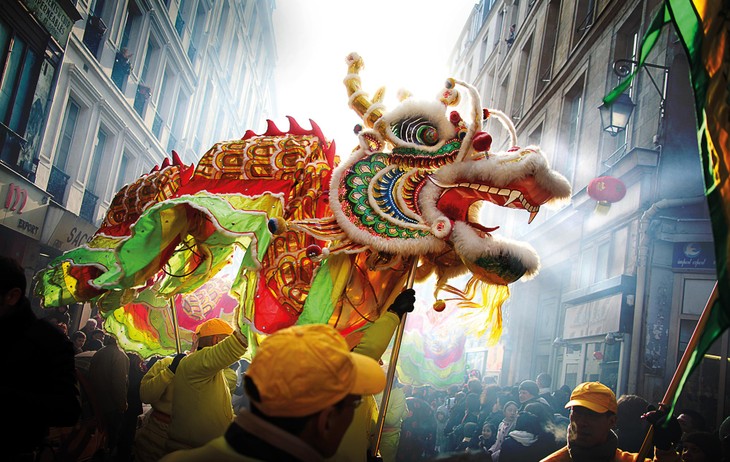 Lion and dragon dances are common sights during the Lunar New Year in China, especially since 2024 is the Year of the Dragon. (Photo: Public Domain) Lion and dragon dances are common sights during the Lunar New Year in China, especially since 2024 is the Year of the Dragon. (Photo: Public Domain) |
A festival is not complete without an array of the local cuisine. At any Lantern Festival in China you’ll find stalls selling piping-hot dumplings and noodles and refreshing bowls of colorful shaved ice. But the star of the Lantern Festival is definitely tangyuan, or glutinous rice balls.
"My favorite part of the festival is the food. There are a lot of amazing things to eat here. The most famous one is probably tangyuan, rice balls served in a hot soup. It’s very soft and chewy since the balls are made of glutinous rice. This dish comes in different flavors but I think most people prefer it with sweet fillings like sesame or peanuts. Nowadays, I even see places making it with chocolate or custard flavor. People love tangyuan not just because it’s delicious and quite easy to make, but also because its shape and the name tangyuan symbolize completeness and togetherness, like a family reunion. That’s why many believe that eating tangyuan will bring you happiness and good luck for the new year," Xuemei said.
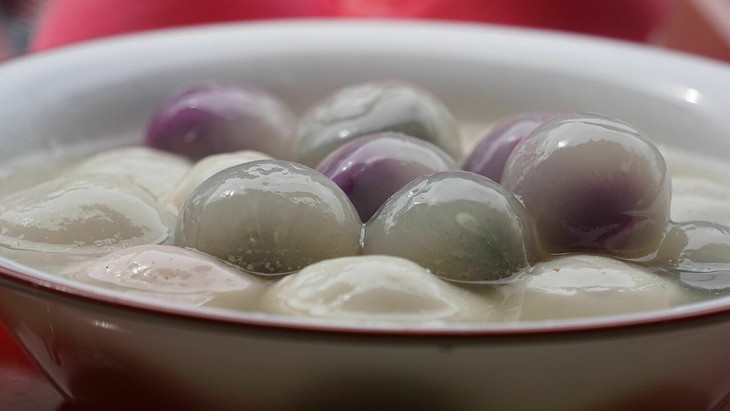 One of the most famous dishes to enjoy during the Lantern Festival in China is Tangyuan, which are chewy glutinous rice balls served in a hot soup. (Photo: Creative Commons) One of the most famous dishes to enjoy during the Lantern Festival in China is Tangyuan, which are chewy glutinous rice balls served in a hot soup. (Photo: Creative Commons) |
Thousands of years have passed since the first Lantern Festival, yet the festival has stayed true to its roots as an occasion to meet loved ones and wish for good fortune in the new year. The Lantern Festival is held, not only in China, but in overseas Chinese communities, to keep nostalgia alive and introduce the tradition to other people all over the world.